Agents, tampering and cash: How Bradley basketball and the MVC navigate the wild world of NIL
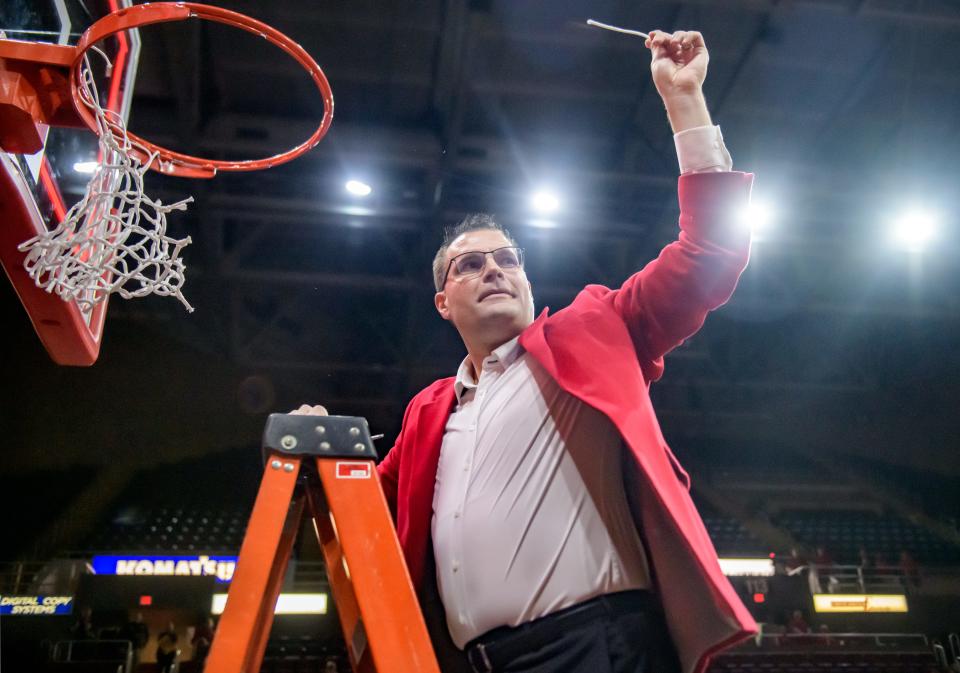
PEORIA — The idea of name, image and likeness (NIL) has a seat at the NCAA athletic table, and it's not going away. Coaches, school administrators and players now are dealing with a new and unregulated frontier in college athletics.
It's the wild, wild west era right now as NIL heads into its second season. The Bradley Braves and their Missouri Valley Conference league-mates navigate new terrain that now allows college athletes to profit from the use of their name and images.
We talked with Bradley coach Brian Wardle, MVC coaching icon Ben Jacobson of Northern Iowa, and league commissioner Jeff Jackson to help assess how the league is dealing with the changing dynamics — plus checked in with the NIL collective working with Bradley athletes.
What do the coaches see with NIL?
Wardle, about to begin his ninth season as coach at Bradley, and Jacobson, the dean of the Valley ahead of his 18th season, see multiple issues — good and bad — arising from the implementation of NIL: Agents, tampering, broken promises and more.
"We're starting to see agents get more involved with the transfer portal and NIL," Wardle said. "Spring recruiting has become a huge thing. With the transfer portal rules, you essentially have to re-recruit your current team at the end of every season. And you know there are people approaching them with NIL promises."
Said Jacobson: "Whether we like it or not, as coaches, people are reaching out and contacting players. We all hear the same stories. Unfortunately, they are reaching out whether directly to the players or through people close to the players while the season is still going on."
Through it all, the coaches understand what NIL is — and what it isn't — for schools in the Valley.
"Missouri Valley Conference teams can't compete with the bigger schools in NIL. But we don't have to," Wardle said. "I like getting younger players, developmental guys, we do a great job with that. Do what's best for your program. Give things 5-10 years, and I think we'll know what the positives and negatives are of NIL and the portal rules."
So when a recruit is looking at a Valley program vs. one in the Big Ten or another Power Five conference, the dollars and cents just often don't add up.
"Those leagues, they've got more money than we do," Jacobson said. "So whether it's recruiting or resources or facilities, they have (more money) and that's going to be a part of it for NIL, also. We've got to find ways to do things that allow us to be competitive, and I think we do a great job of that in our league."
How does a school keep a player using NIL?
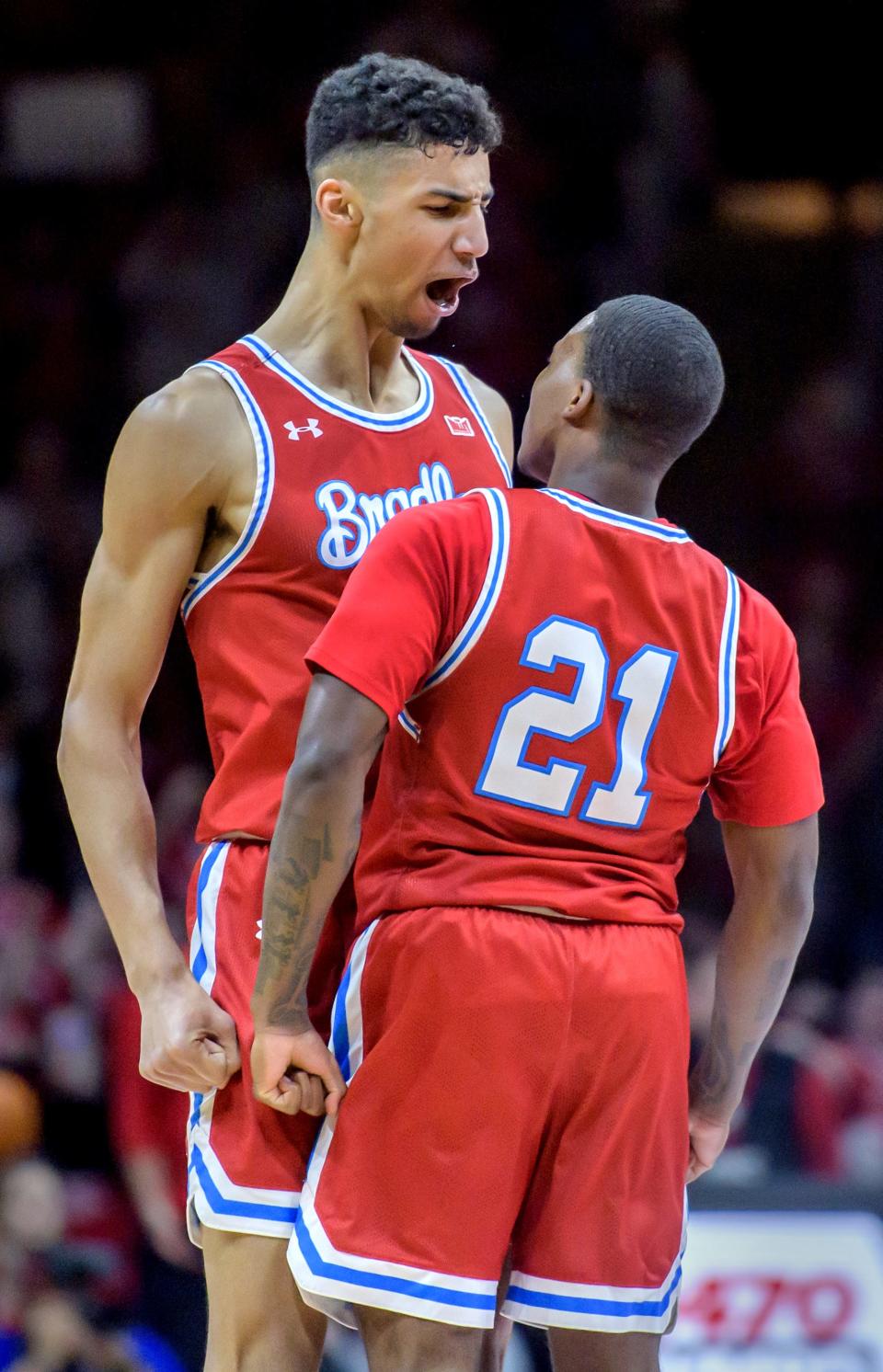
Bradley star forward Malevy Leons was MVC Defensive Player of the Year and led the Braves to their first MVC regular-season conference championship in 27 years in 2022-23. He was the first player in league history to pile up more than 50 blocks and 50 steals in a single season.
Those who know Leons' situation said he was chased by teams after the season. Leons stood firm with his announcement before the 2022-23 season ended that he was coming back with the Braves. But other teams wanted him.
Bradley's NIL collective, called Home of the Brave, stepped in and helped keep Leons here with a deal believed to be in line with what elite stars in the league are making.
"He obviously had — like every other first- and second-team all- MVC players — opportunities," said Home of the Brave co-founder Joe Messmore. "We feel like we helped him make his choice for the BU program, seal his choice. We don't discuss specific player deals or money. We're just glad he's here, because he's a terrific player and person."
More: 5 important ways the Bradley Braves basketball team is building culture this offseason
NIL collectives are a growing force now that college players can be paid for things like autographs, attending events, making commercials for businesses, endorsing products, teaching clinics and more.
Messmore said Drake has a collective — "DU Great" — and so does Illinois State, called "Empower the Nest," which funds athletes for all sports, not just basketball and football. SIU has a collective, as well as other schools around the Valley, according to nilnetwork.com.
"It's going really well for us," Messmore said. "A lot of people in town have embraced it and the idea of maintaining that championship-level culture at Bradley. Winning that championship doesn't hurt. We have double in the bank account from last year. And we've grown now to about 75 members."
The idea is to make sure Bradley is on a level playing field with mid-major programs in the Valley and the region.
"When we went into this, we never had illusions of competing with Illinois or Ohio State for recruits because we weren't doing that to begin with," Messmore said. "Now if some billionaire comes along … I still think we're the best in the Valley, better than Loyola, Drake, better than (regional competitor) SLU — and that's what we want to maintain."
What's the NIL rate for a Valley player?
So what's the going NIL rate for players in the Valley?
A rotation-level player is believed to likely get $5,000-$10,000 in the Valley. The top-three players on a team's roster and potential all-MVC honors-caliber players could get up to $20,000. An elite league-wide star will be negotiated and could see high five figures, depending on competition from other schools.
Fellow Home of the Brave founder Steve Cicciarelli, in a story last October, said he felt the collective, had it existed before BU star guard Terry Roberts transferred to Georgia after the 2021-22 season, might have been able to keep him here.
"The key to a mid-major is to keep players at your program by giving them some money when they are freshmen, so if another school later offers them $25,000 and they are already getting $18,000 from us we think they will stick around due to the connections that we have made," Cicciarelli said, explaining the collective's philosophy. "However, if another school offers them $500,000 … that is another story."
But it's not just about money. The collectives are also tasked with protecting players from getting drawn into deals that might take advantage of them or hurt their image.
"What's probably not being spoken enough is how many times our student-athletes are being promised things and those promises are not coming true," MVC commissioner Jeff Jackson said. "You have people who have no tethering to any type of responsibility. They can say whatever they want, and then a student-athlete arrives on campus and it's a very different story.
"What always kind of rubs me the wrong way is to have such a vibrant aspect of student-athlete life not to be somewhat under the auspices of coaches and administrators when it comes to 17-, 18-, 19-year-olds existing on their campuses. I just don't think that's a very good place for us to be."
Said Messmore: "We see and hear some really stupid stuff happening with NIL deals."
What is Congress doing to shape NIL?
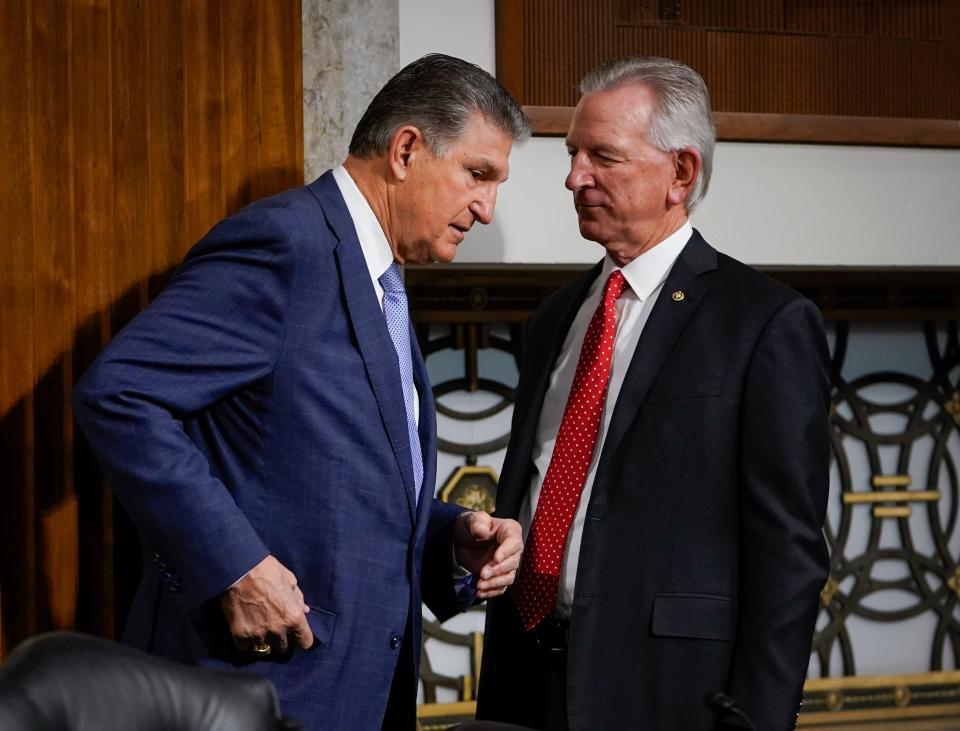
Congress is getting into the NIL regulation game, with three bills recently dropped.
"For the benefit of student-athletes in colleges and universities there is a need for regulation as related to the current space," said Chris Reynolds, Bradley's vice president for intercollegiate athletics, and chairman of the NCAA Division-I basketball committee. "I don't think anyone knew what to expect (with NIL).
"We can only deal with the realities and make the adjustments that are appropriate. (NCAA president) Charlie Baker and the NCAA continues working on so many variants. Regulation in the area of agents is needed for a variety of reasons. Some other facets are unknown. Sometimes with these things, there are unintended consequences."
There are three prominent proposals/bills in Congress right now:
• A proposal by Rep. Gus Bilirakis, R-Fla., includes the creation of a “new regulatory body tasked with establishing and enforcing rules pertaining to collectives, boosters, and student-athlete endorsement contracts. Student-athletes who enter into a contract will be required to report their agreement to this new body and their university within a specified period.”
• Another is a draft proposed by Sens. Richard Blumenthal, D-Conn., Jerry Moran, R-Kan., and Cory Booker, D-N.J., in which standards would be created, in part, and enforced by a new entity that would be called the “College Athletics Corporation.” It would not be a government agency, but it would be granted investigative and subpoena powers.
The CAC would be charged with creating a formal certification process for people seeking to represent athletes in NIL dealings. It also would maintain a publicly available database showing a variety of data that schools would have to provide annually, including the number, average and total value of athlete endorsement contracts, all broken down by sport, race and ethnicity, and gender.
"I wouldn't mind if every state was on an equal playing field," Messmore said. "For example, Missouri has a caveat in their state NIL language where collectives can pay kids in high school if they've signed a letter of intent with a Missouri college.
"I personally disagree with the part in some of these bills that makes these deals public. Frankly, if Duke Deen goes out and signs a $20,000 deal with Avanti's, for example, it's nobody's business. And another thing, any sort of financial cap I disagree with."
• Sens. Tommy Tuberville and Joe Manchin have introduced the Pass Act of 2023: Along with creating a national law for NIL deals, the Pass Act would also require schools to provide health coverage for sports-related injuries for eight years after athletes finish their college eligibility. Athletic departments that generate more than $20 million annually would also be required to cover out-of-pocket medical costs for two years after an athlete's playing career. Athletic departments that generate more than $50 million annually would have to cover four years of out-of-pocket expenses.
The bill also seeks to create a certification process for agents that work with college athletes, a public database for anonymized NIL data, and a uniform contract for athletes to use in NIL deals.
More: Bradley basketball wraps up roster rebuild with transfer from the Big East
The senators also suggest making it against federal law for a college athlete to transfer without sitting out a year until he or she has used at least three years of college eligibility. Coaches and athletic directors have complained during the past year that the combination of NIL money and a relatively new NCAA rule that allows players to transfer without penalty has made it difficult to maintain a steady roster.
Even defining an NIL collective's place in tax law is fluid.
"Some collectives formed as a 501c3," Messmore said. "We didn't do that, we formed as a 501c7, which is similar to country clubs in that we are not-for-profit but not a tax-deductible charity. The IRS recently stated that contributions to NIL collectives are not tax deductible. So some of those 501c3 entities have to re-form."
What does the Missouri Valley want with NIL?
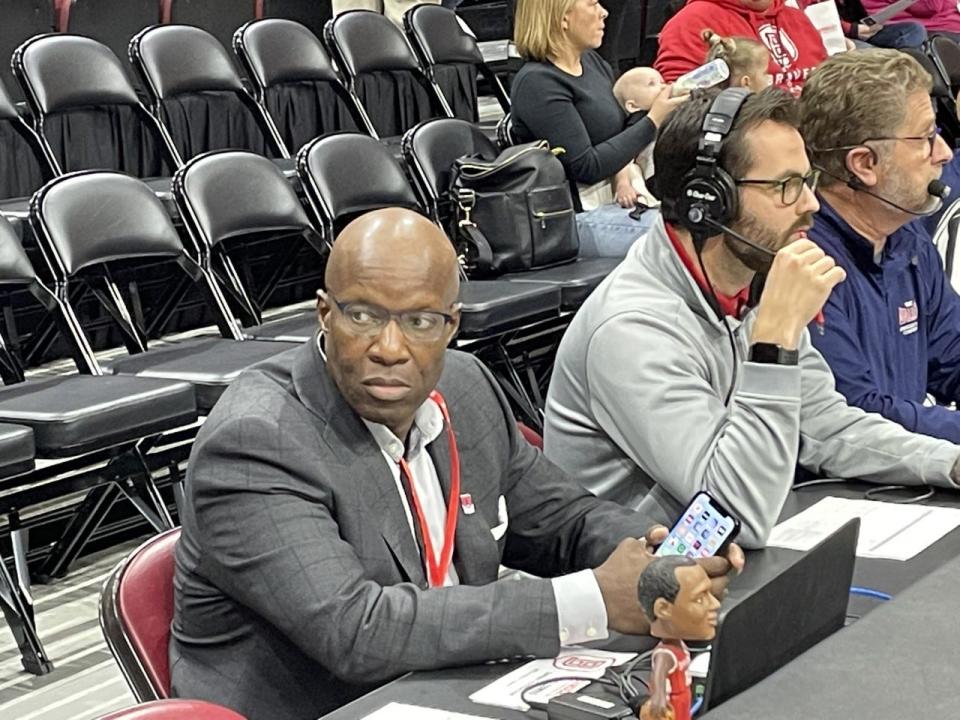
Jackson just received a five-year deal that will keep him at the MVC helm as commissioner through 2028.NIL, by then, will hopefully be under control. The commissioner said that the MVC had embraced NIL from the start, calling it a "very positive and good thing" for athletes.
But regulation is needed, he said.
"We don't have transparency, we don't have certification, we don't have consumer protectionism when it comes to taking care of our athletes," Jackson said. "We don't have a way to actually figure out what a fair market value is."
Jackson said NIL had become a way to recruit players to schools — something he says was never the intention, and something he says college conference commissioners and Congress knows is not in athletes' long-term interest.
"We know right now it's in the inducement state, and it was never intended to be part of recruitment," he said. "So I think there's an understanding in all conferences, among all commissioners and at the legislative level (Congress) that this is something that does not benefit student athletes ... I think, I hope, in the next 6-12 months we're going to see legislation that speaks to that and creates a more even playing field on what has become a pretty volatile topic."
Jackson would like to see careful regulation of NIL collectives, too.
"Our schools participate in the Collective space, that's just par for the course right now in this market," he said. "Boosters aren't going away. So whether you want to call them collectives or call them boosters, their financial impact in NIL space is not going to go away. ...
"We want to make sure that is regulated, managed in a way that our student-athletes aren't being exploited."
How are Bradley and UNI navigating NIL?
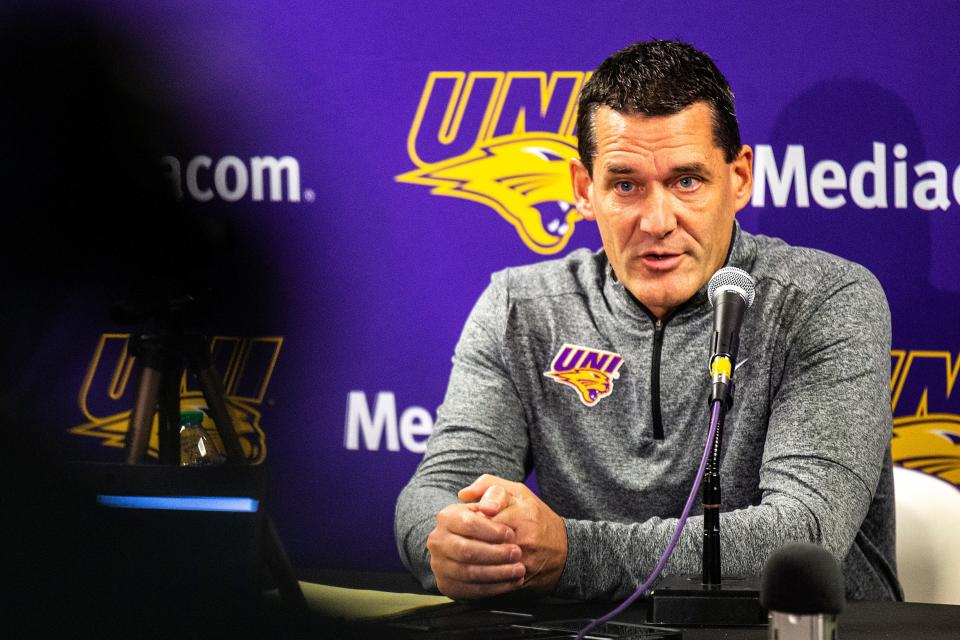
NIL fits hand-in-hand now with the NCAA transfer portal and its relaxed rules. Agents have swooped into the picture, contacting players and making NIL promises. Those agents get anywhere from 5-20% of what players earn. Coaches now must invest enormous time as soon as the season ends working to retain players already recruited and signed.
"What we're realizing is the relationships built when recruiting high school kids are valuable, because even if you don't get them, they might transfer to you 2-3 years later," Wardle said. "If you can find younger players in the portal, where you can get 2-3 years out of them, it's a benefit. That's the No. 1 thing, it's the reality."
More: Former Bradley basketball star finds new team in the Big Ten Conference
UNI was a virtual unicorn this offseason, as one of only six teams in the NCAA not to lose a player off its roster via the transfer portal. It was a relief for Jacobson, who is warming up to NIL, albeit with some reservations.
The coach's first take was to favor the traditional system, noting kids earned a scholarship in high school, got the chance to play 4-5 years of college ball with their education paid for, be part of a program, build relationships and move on in life with achievements and skills in hand.
"I've always felt like that is a tremendous opportunity, one that has to be earned," Jacobson said. "So (NIL) I didn't like it initially. Now that we have it, and understanding the change in time demands for student-athletes — it's been such a significant shift over the years and I'm old enough now where I go back to when I played, when I started coaching, that's 30-plus years now — the time demands have changed so much.
"And then you get to the financial piece and there is a lot of money being generated by student-athletes for a program, so I've certainly come around to NIL and I do like it."
But the amount of money is growing rapidly in the NIL landscape, and it's being used to help induce players to leave programs that have already invested a lot in them via recruiting and coaching and scholarships.
"The piece that I struggle with — and I think a lot of us do no matter what level you are coaching at — Name Image Likeness was put in for the players who are on your team," Jacobson said. "For the players in your program, on your team, able to make money off of what they are able to generate.
"What it turned into immediately was spring recruiting, going out and buying players. That wasn't the initial intent, and that part of it none of us like. When you recruit someone, sure, they can learn what the players in your program are getting. But just to go out and start offering guys and gals money in the spring and buying players, in a sense, I'd love to see us get a handle on that.
"I don't know how you get the train back on the tracks."
Dave Eminian is the Journal Star sports columnist, and covers Bradley men's basketball, the Rivermen and Chiefs. He writes the Cleve In The Eve sports column for pjstar.com. He can be reached at 686-3206 or deminian@pjstar.com. Follow him on Twitter @icetimecleve.
This article originally appeared on Journal Star: NCAA NIL: How Bradley, Missouri Valley deal with NIL in basketball

